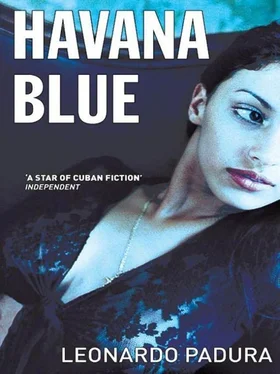“Anything from the coastguards?”
“Not much. Not many people try it when this north wind is blowing, but, look, this has just come in from East Havana. Take a look…”
The Count took the computer printout the sergeant was flourishing in his direction and read the first remarks after the heading:
Unidentified corpse. Evidence of murder. Signs of struggle. Case opened. Forensics’ preliminary report: 72 to 96 hours since death. Found in an empty residential house, Brisas del Mar. January 5/89, 11.00pm.
And he turned the sheet over on her desk.
“When did this come in, Dalita?”
“Ten minutes ago, Lieutenant.”
“And why didn’t you call me?”
“I called you as soon as it arrived and Manolo told me you were on your way.”
“Any more information?”
“This other sheet from Forensics.”
“Let me have it. I’ll return it later. Thanks.”
I was still in uniform, always carried a briefcase and spent hours in the archives with Felicia, that old computer that seemed a mysterious, over-efficient window on the world. My pistol was in my belt, but my cap had no such luck; I tried never to wear it after reading in a magazine that caps are the number one cause of baldness; it was almost nine pm and all I wanted to do was collapse on my bed, and I was thinking about bed as I walked to the bus-stop when I heard a klaxon hooting, I cursed as I always curse people who blow their klaxons like that, and looked up to see what kind of guy it was, he’d have two horns and perhaps a trident in his hand, and I saw an arm waving at me from above the car roof. At me? Yes, at you. I couldn’t see clearly because the windscreen was glinting and it was dark, and I went over hoping to hitch a lift. I hadn’t seen him for almost five years, but I’d have recognized him even if it hadn’t been for a hundred.
“Hell, buddy, my hand almost dropped off hooting at you,” he said, smiling his usual smile, and heaven knows why I was smiling as well.
“How’re things, Rafael?” I asked, putting my hand through the window. “It’s been ages. How’s Tamara?”
“You going home?”
“Yes, I just finished and was…”
“In you get, I’ll drive you to Víbora.” And I got into his Lada, that smelled brand new, of leather and liniment, and Rafael drove off, the last time we spoke.
“What you up to now?” I asked, as I always ask anyone I know.
“The same as usual, in the Ministry for Industry, waiting to see what turns up,” he informed me casually, talking in that affable persuasive tone he adopted with friends, very different to the hard, even more persuasive tone he’d employ from a platform.
“So they’ve given you your own car?”
“No, not yet, this one’s assigned to me and, you know, it’s as good as mine, because I’ve just come from a meeting at the Chamber of Commerce, and that’s how I spend my life. I work hard…”
“How’s Tamara?” I repeated, and he barely managed to say she was all right, that she’d done her social service here in Bejucal, and was now at a new clinic they’d opened in Lawton. No, we still don’t have children, but we’ll order one any day now,” he added.
“And how are you getting on?”
I tried to see what film they were showing at the Florida when we drove through Agua Dulce and I thought I’d tell him not so good, that I was just a bureaucrat processing information, that last month Skinny had been operated on again, that I didn’t know why I’d married Martiza, but I didn’t feel like it.
“Good, pal, good.”
“Hey, drop by one day and let’s have a drink,” he suggested as we reached October Tenth and Dolores, and I thought how it was the first time Rafael had ever said anything like that to me, or to Skinny or Rabbit or Andrés or any of us, and when he pulled in at the traffic lights in Santa Catalina so I could get out, I responded in kind: “Yes, be seeing you. Give my regards to Tamara.”
And we shook hands again, and I watched him turn into Santa Catalina, his red indicator blinking; he gave two farewell toots and drove off in the car that smelled brand new. Then I thought: you bastard, you’re only interested in being my friend because I’m in the police. And I had to laugh, that last time I saw Rafael Morín.
His eyes no longer shone; his voice no longer boomed at the masses. His freshly-shaven, washed and wideawake face no longer bore that squeaky clean sheen. He no longer smiled automatically and confidently spread light and good vibrations. It seemed he’d put on weight, a sickly purplish fat, and his brown hair urgently required a comb.
“Look who it is,” said the Count, and the forensic doctor pulled the sheet back over him again, like a curtain falling on the last act of a play that lacked emotion or charm.
“Well, if it isn’t my friend the Count,” he said, and the Count thought: He’s blacker than the tar the roads could do with.
Lieutenant Raúl Booz smiled, and his white young colt’s teeth brought a shaft of light to the jet-black expanse of his face. Nobody would guarantee he was more than seven feet tall or weighed in at three hundred pounds, but the Count turned into a bag of nerves just looking at him. “How can he be that big and black?” he asked himself as he got up and shook Detective Lieutenant Raúl Booz’s hand.
“You already know Sergeant Manuel Palacios, I believe?”
“Yes, of course,” replied Booz, who also smiled at Manolo and settled down on the sofa that filled the space next to a wall in his office. “So you were the one looking for this guy?”
The Count nodded and explained the story behind the disappearance of Rafael Morín Rodríguez.
“Well, I’m going to hand him over to you all sewn up, my friend. It will be the easiest case you’ve ever had. Take a look at this.” And he handed the Count a file that was on the sofa. “There was a hair with capillary tissue under one fingernail. Naturally, it must belong to his killer.”
“And what are the results of the autopsy, Lieutenant?”
“As clear as daylight. He died on the night of the first or early in the morning of the second. Forensics can’t be sure because the cold helped preserve the body, and that’s why nobody knew a corpse was there. He had a fractured second and third cervical vertebra, which pressed down on his spinal cord, and that was what killed him, and his brain was severely banged about, but that wasn’t lethal.”
“But what happened, Lieutenant, what do you reckon?” Manolo interjected, ignoring the file the Count was handing him.
Lieutenant Raúl Booz, head of the criminal investigation squad in East Havana, looked at his own fingernails before answering.
“The station in Guanabo got a call last night at about ten saying a strange smell was coming from an empty house in Brisas del Mar and that the back-door lock had been forced. It’s a block of only two houses, one that’s empty in winter, and the one belonging to the woman who called that’s about twenty yards away. The people in Guanabo went to look and found a dead body in the bathroom. All the signs pointed to the man dying when he fell against the bath, but the blow was so hard he can’t just have slipped, Palacios. He was pushed and before that there was a skirmish during which the dead man scratched his murderer and took out the hair we analysed. He’s a white man, in his forties, between five foot four and five foot eight tall and, naturally, black haired… That’s just for starters.”
“And enough to finish on, Lieutenant,” replied the Count.
“But there is a complicating factor. Although the murder was probably not premeditated, something very strange happened afterwards. The murderer stripped his victim and took his clothes away, and there’s no sign of the briefcase or leather bag the dead man must have been carrying before the fight, given the traces of leather on his hands, and it must have weighed a fair amount because he kept passing it from one hand to the other.”
Читать дальше











